Yves here. Recall that Helmer is particularly well positioned to vet third party research into the jockeying among key players in the Carter Administration, particularly with respect to Russia policy. This version of history also highlights the harm that what looks like a policy success can turn out to be anything but with the passage of time…and that powerfully placed individuals like Brzezinski, Bob Rubin, and Dick Cheney can do tremendous harm.
By John Helmer, the longest continuously serving foreign correspondent in Russia, and the only western journalist to direct his own bureau independent of single national or commercial ties. Helmer has also been a professor of political science, and an advisor to government heads in Greece, the United States, and Asia. He is the first and only member of a US presidential administration (Jimmy Carter) to establish himself in Russia. Originally published at Dances with Bears
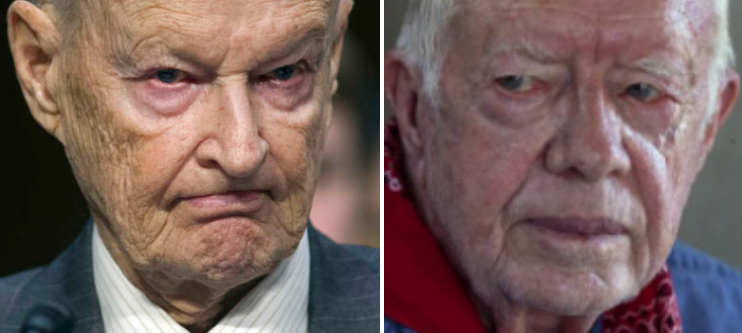
If ever there was a man who displayed on his face the evil in his mind, it was Zbigniew Brzezinski (lead image, left), the national security advisor for President Jimmy Carter (right) when the US plot to start the war against the Soviet Union on the Afghan front was hatched in 1979. “Now we can lure the Russians into the Afghan trap,” he wrote Carter in a secret note of February 1979. In July of that year he followed with the directive Carter signed in secret to supply arms to the mujahideen “to induce a Soviet military intervention”. In December 1979 Brzezinski told Carter: “we should not be too sanguine about Afghanistan becoming a Soviet Vietnam”. Later he used to boast that had been precisely his intention and also his crowning achievement.
Brzezinski’s lips are sealed now because he’s been dead for four years.
Carter is still alive. In 1979 he kept the evil on his mind secret behind the smile on his face. His lips are sealed now, since the retreat from Afghanistan began by the US Army, and after the rout last month in Kabul. The mainstream American press are not reporting they have asked Carter for comment, or that he has refused. Not even the alt-media investigators have pursued him.
But it’s already clear what Carter thinks. He believes he scored one of the wold’s great strategic victories; he is disgruntled that he has never received the public credit he thinks he deserves. In the words of one of the CIA men in charge of Afghanistan operations in 1979, Carter’s strategy was to wage the “fight [against] the Soviets that went on to win the final and decisive battle of the Cold War.”
A new book by Paul Fitzgerald and Elizabeth Gould, just published, opens the story of what Brzezinski and Carter really did to start the US war in Afghanistan, starting with the assassination of Adolph Dubs, the US Ambassador in Kabul on February 14, 1979; his killing with four pistol shots to head in a Kabul hotel room, the book concludes, was part of the White House plot.
“Some unnamed Americans claimed the Soviets wanted Dubs out of the way so they could set up for their invasion,” Fitzgerald and Gould report. They go on to name the Americans, one an agent of the Drug Enforcement Administration (DEA) in Kabul, another a CIA agent. “But the Soviets got along famously with Dubs because he wasn’t an anti-Soviet Russophobe like Brzezinski. There was also plenty of evidence to show the Soviets didn’t want to invade. They went on record with the U.S. embassy throughout the summer of 1979 trying everything to avoid it. And besides, the rules of the game made ambassadors virtually untouchable. There was no upside to killing one, and a big downside.”
The assassination of Dubs, Fitzgerald and Gould argue, “led to the Soviet invasion nine months later….Who would kill an ambassador? Not a rival superpower trying to get the American Congress to sign a nuclear arms deal they’d desperately needed. And certainly not a third-world backwater desperate for U.S. aid and recognition. Only someone trying to provoke retribution. And who would want that retribution? Zbigniew Brzezinski. Brzezinski blamed the Russians, but then Brzezinski always blamed the Russians… If it hadn’t been for the Dubs murder there would never have been a Soviet invasion.”
Fitzgerald and Gould are a husband-and-wife team from Massachusetts which has been investigating and reporting on the war in Afghanistan since they negotiated their first filming trip to Kabul in May 1981; then the second in May 1983. Their book, The Valediction, Three Nights of Desmond, they call a “novelized memoir”; read it here. It is unclear what “novelized” means.
Beside the evidence of what they discovered years ago and since, Fitzgerald and Gould also record the attempts to suppress and erase their story by CBS, ABC, and PBS – the mainstream US television media – and newspapers like the New York Times, Washington Post, Boston Globe and the Christian Science Monitor.
“How in the world could a person live a normal life knowing these things?” they asked themselves. “They couldn’t”, the book answers. When they discovered they have been manipulated, subverted and convinced of lies, starting at the White House and extending throughout the US press, it came to Fitzgerald and Gould as something of a shock. The problem, they also concede, will be the same for the readers of the book. Their answer to that: “’It’s all going on whether we know it or not. I’d rather know it,’ she [Gould] said.”

Left to right: The Valediction, Three Nights of Desmond; Elizabeth Gould, Paul Fitzgerald; Selig Harrison.
The one other reporter who knew the full story, who had been told the story of Brzezinski’s lying and scheming by Dubs himself, was Selig Harrison. He had been the Washington Post’s foreign correspondent until 1972 when he retired from field reporting to become a think-tank researcher based in Washington. Harrison died in December 2016.
His book with the United Nations negotiator on Afghanistan, Diego Cordovez, Out of Afghanistan: The Inside Story of the Soviet Withdrawal, published in 1995, is the story complementing this new one. It reveals how Brzezinski’s and Carter’s successors in Washington tried to stop the Soviet withdrawal from Afghanistan and actively sabotaged every round and every term in the peace and withdrawal negotiations with Moscow. Read that book here.
Fitzgerald interviewed Harrison in Washington in August 1982, and records now what Harrison said then. “ ‘Dubs arrived with a mission,’ he told us. ‘Bring the Afghan leader Hafizullah Amin closer to the American side and keep the Russians out. It’s really a shame we lost him [Dubs]. He was uniquely qualified – one of the few Americans with a nuanced view of the Soviets….He’d spent years at the U.S. embassy in Moscow developing relationships with his Soviet counterparts. He wanted everybody to know destabilization would induce an invasion and was adamantly against Brzezinski’s anti-Soviet plots.’
‘But how did that go over with the neocons?’
‘Not well,’ [Harrison] said. ‘Brzezinski thought it was all nonsense. He saw the Soviet invasion as a great vindication of his point of view.’
‘So in a sense Brzezinski wanted to provoke the Soviets to invade.’
‘I don’t want to go on the record as saying that, but that’s what I believe. Brzezinski and Dubs were working at cross-purposes during late 1978 and early 1979. Dubs tried to play it safe by ordering a research paper on the possibility of provoking a Soviet invasion before he left. But no one took him seriously.’”
Harrison revealed to Fitzgerald that Dubs had been meeting the Afghan president Amin fourteen times in secret, before Dubs was murdered; and then Amin. Dubs had kept the meetings secret from Brzezinski, Carter, and also the CIA agents in the Kabul Embassy.
Harrison again: “ ‘[Dubs] came out [to Kabul] with a very sophisticated conception of what he was going to do, which was to try to make Amin into a kind of Tito, in other words, detach him. Dubs knew how subtle an operation it had to be. He had no illusions it could be done quickly. He would still be pretty close to the Russians, but he’d have more freedom of action and it would be enough to make it safe from our point of view. He met with Amin fourteen times and quickly understood that he was not a loyal Communist. He even bragged that the Soviets needed him more than he needed them. But the trick would be to keep a back door open to American influence while not triggering Soviet countermeasures.’
‘How did that work with the Soviets?’ I [Fitzgerald] asked.
‘They were greatly alarmed because they thought Amin might be a CIA agent. And Brzezinski was actively promoting an aggressive covert anti-Soviet Afghan policy without the State Department’s knowing much about it. So it was extremely dangerous,’ Harrison added. Harrison’s analysis confirmed our suspicion. The issue with Afghanistan didn’t originate in Moscow; it originated in Washington and was likely triggered by Brzezinski.”
The forensic evidence at the scene of the Dubs killing, the post-mortem in Washington, and the subsequent witness and file records, are carefully re-examined. According to Fitzgerald and Gould, the evidence of Soviet involvement on which Brzezinski, Carter and the entire US press corps fastened was entirely fabricated. Fitzgerald and Gould present the evidence for an elaborate heroin-related plot by Amin, his police and security men, and some of his regional tribal allies, with knowledge of the US chief anti-narcotics agent in Kabul, Harold (Doug) Wankel. The Afghan policeman whom they believe shot Dubs with his pistol is dead. Wankel is still alive.
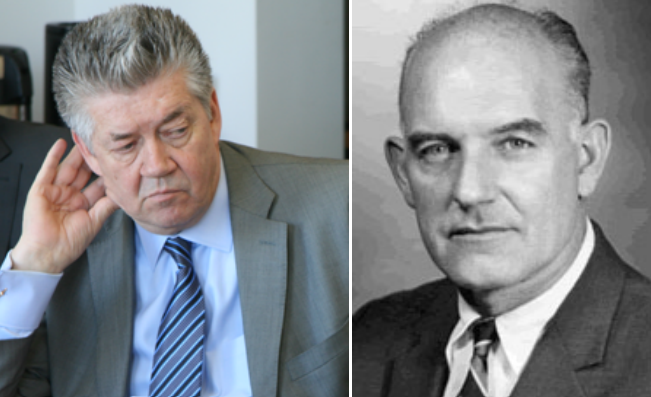
Left: Harold (Doug) Wankel, Former Chief of Operations, Drug Enforcement Administration, Former Chief of Intelligence, Drug Enforcement Administration, and Former Director, Kabul Counter Narcotics Office of US Embassy Kabul (2004-2007). Right: Ambassador Adolph (Spike) Dubs. Warren Marik, the CIA agent on the scene with Wankel according to the new book, has not been photographed in public. Marik has put his experience at assassination on the record.
The US officials involved in one part or another of the plot to open the Afghan war front against the Kremlin are named in the book. They include Paul Nitze, Richard Pipes, Richard Perle, Theodore Eliot, George Griffin, Warren Marik. Also named, as the plot thickened, are British and French intelligence officials of the time.
Fitzgerald and Gould also document their direct experience of lying, concealment, film and print faking, and US government propaganda operations by the leading US reporters of the time.
The CBS Propaganda Team
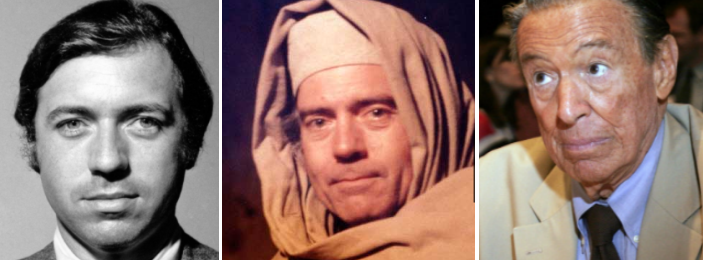
Left to right: Peter Larkin CBS producer supervising Fitzgerald’s 1981 trip to Kabul. Now dead, Larkin’s obituary includes this note of his professional pride: “A proud moment was while in conversation with Air France attendants, they mistook Peter for a native-born Frenchman”. Centre: CBS correspondent and presenter, Dan Rather in his “Gunga Din” costume as an Afghan freedom fighter. Right: Mike Wallace, CBS Sixty Minutes presenter and Russia lie fabricator.
The New York Times Propaganda Team
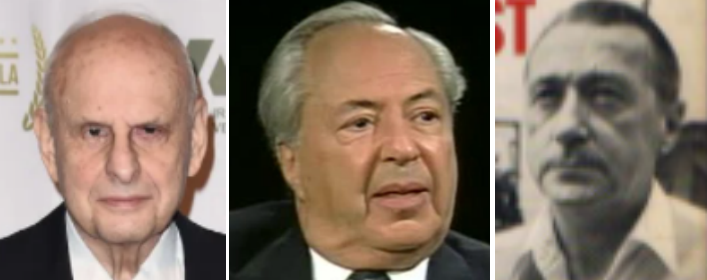
Left to right: Leslie Gelb; Tad Szulc; Robert Trumbull, author of the first New York Times story blaming the Soviets for Dubs’ death, February 1979.
Three-quarters of the way through the book, from page 167, Fitzgerald and Gould introduce a source identifying himself as Desmond Fitzmaurice, a dealer in antiquities whom Fitzgerald says he met on the terrace of the Kabul Hotel in May 1983. This talkative Anglo-Irishman appears to be suffering from a condition that has infected the Irish people and those who listen to them for centuries – its clinical name is blarney. “I had arrived at a place…where I could no longer discern whether I was awake or in a dream”, Fitzgerald acknowledges at page 169. Readers valuing the achievement of the book should follow him that far – but needn’t go further.
The independent proof of the book, and of what Harrison kept off the record almost forty years ago, can be found in two places. The first is likely never to be opened; that’s Carter’s memory and his personal papers.
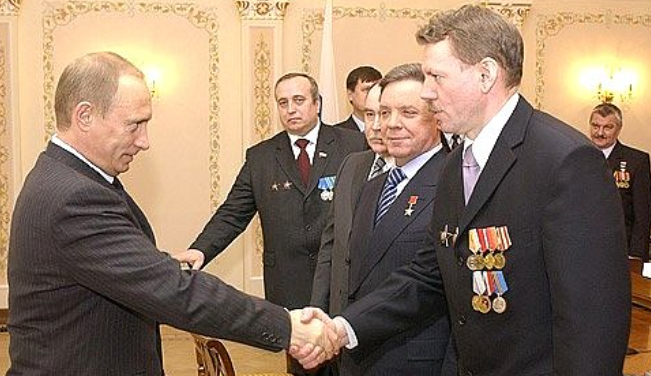
President Vladimir Putin meeting Afghan war veterans at the Kremlin, February 19, 2004; General Boris Gromov, who headed the withdrawal, is 3rd from right. The withdrawal anniversary was also publicly celebrated by Putin in 2018, 2019, and 2021.
The second is in the archives of the KGB, the Soviet military intelligence agency and General Staff, and the Soviet Foreign Ministry. For the time being, they have not been released or reported in Russia, although in his regular celebrations of the anniversary of the Soviet withdrawal from Afghanistan on February 15, 1989, President Vladimir Putin has identified the Army’s performance of “their duty and upheld the interests of the Fatherland, demonstrating supreme professionalism, unparalleled courage and strength of mind.”
The Brzezinski-Carter plot, including the truth of Dubs’s death, will continue to succeed if the disclosure of the Russian records is not believed – because they are Russian. The plot will fail again for that reason, as it just did.
NOTE: For more on the evil that was Brzezinski, read THE COMPLETE DANCES WITH BEARS COMIC BOOK – out this month. Carter and his fabricated smile make a cameo appearance.


I have been reading about American “diplomacy” since I was a child. So, over forty years. Haphazardly, true, but still. Books, magazines, documentaries, podcasts, etc. Yet, every time I think I have a handle, something very soon comes and figuratively whacks me upside my head for this hubris.
Ever since the illegal annexation of the Kingdom of Hawaii and the whipped up, jingoistic Spanish-American War in 1898, not including the previous three centuries of the Indian Wars, American foreign policy has one long, unending sewer of lies, betrayals, deceits, theft, and general bull manure.
If anyone wants to understand just why the latest fiasco is so unsurprising to many, you could start by reading up on Hawaii, Cuba, the Philippines, and Puerto Rico in the aftermath of the American conquests. Then follow up with The Korean War, specifically the various war crimes specifically the massacres and the support of the murderous South Korean regime, although the also murderous North Koreans did start the war by invading the south, followed Prime Minister Mosaddegh of Iran, then the Iranian Shah, then Vietnam after 1945, starting with when the Americans let the French back in ending in 1975 with the Fall of Saigon with that iconic picture of the final helicopter lifting off from the American embassy’s roof.
And yes, that ghoul Kissinger, Madam Clinton’s “guru” should have been tried at the Hague. One can always dream. His realpolitik was and is just an excuse to make the so called hard choices easier by using human blood as the lubricant. Much like how too many elites seem to mumble, today.
Just so you know, all this is perhaps the smaller half of what the United States government has done. Really. For extra fun, I can suggest the Jakarta Method, I haven’t finish the book titled that, because of being repulsed. However, the method was deliberately replicated by other regimes supported by the United States.
As God is my witness, I love history, and there is much good in it, but sometimes I think I am just creating more nightmare fuel for myself.
Another plug for The Jakarta Methode from Vincent Bevins.
https://www.publicaffairsbooks.com/titles/vincent-bevins/the-jakarta-method/9781541724013/
JBird, “When the first one on my block came home in a box” I was 15 years old and it got my attention.
I was 19 when I came across Alfred McCoys book at Shakespeare and Co bookstore in Berkeley ( I paid $1.50 for a used copy).
I had already witnessed the People’s park riots and seen Cointelpro in action in 1968 when Pot disappeared and China White showed up on the streets big time along with a bunch of new people who were a little bit off…
So I dug into History, as you did.
As a romantic who took the Constitution and the Bill of Rights seriously ( I was young) it was an extremely painful experience.
Now our Government appears to be actively trying to kill off a significant portion of the populace with its handling of the Pandemic.
In some ways I’m glad I won’t be around much longer, I had another serious Cardiac event last Friday and my odds of surviving the winter are not good.
…
Sorry to hear that Tom. You were a regular commenter in the Calculated Risk/Hoocoodanode days, were you not?
Murderous North Koreans?? What are you smoking?? The situation was quite similar to Vietnam in the late 50’s when 80% of the population was in favor of a Socialist government
It is not what people are in favor of, but what the government and the military do. The North Koreans did their own massacres of South Koreans, did forced conscription of the local South Koreans into their army, as well as actually starting the war with a full scale invasion. All this, not to mention that it was and is a dictatorship under Kim Il-sung, and remains so under the Kim family.
The North Vietnamese government had more legitimacy than the Southern Vietnamese government, was not grotesquely corrupt as the south was, but they too had their own massacres, assassinations, and deliberate bombings of civilians.
Societies, like people, are very rarely black and white, right or wrong, but varying shades of grey. Granted the shades can be very light or dark, but still grey.
North Koreans were just trying to liberate the rest of Korea from under American occupation. Americans than immediately after their arrival there hired the former Japanese occupiers to help manage the situation. South Korea is still occupied by American forces and until late 1980s was a dictatorship…
Those scoundrel NK wanted a reunited and liberated Korea, same as the Vietnamese later on.
Yes, but that does not change that North Korea committed war crimes themselves and was and is still controlled by the Kim family under an extremely totalitarian regime likely more brutal than any other regime in the past 150 years excepting Cambodia’s Khmer Rouge, which became just suicidally genocidal.
Vietnam is more nuanced although that still does not excuse the war crimes committed by everyone, and I mean everyone.
In both cases, it was a choice of evils, really while being under the influence or control of the two great empires of the late 20th century with the leadership thinking a daily bit of slaughtering the innocent just good business or at worst merely unfortunate “collateral damage.”
Stephen Kinzer’s book Overthrow is a history of our “adventurism” from Hawaii to Iraq. Should be taught in every school. People would then realize how absurd it is for us to complain about any nation interfering in our elections.
Interesting piece. I profess I don’t know much about the circumstances that led to the Soviet invasion of Afghanistan, but it seems an interesting topic to delve into. On a related note, I recently read Vincent Bevins’ Jakarta Method, which provided me with an ample reading list about the history of the CIA and US foreign policy vis-a-vis communism in the third world. Interesting read.
(PS Yves, there seems to be missing some text in you introduction?)
Oops, yes, some rogue code that disappeared the last words. Fixed, thanks!
I’ve never quite been able to figure Carter out. He seems to have managed to be a genuinely good man who was also a terrible president who actively pursued bad policies. The best we can hope for if we want some sort of truth is that maybe somewhere he has kept an honest journal that will be released after his death. I guess its one of the ironies of history that sometimes terrible policies are implemented by people trying to do good, while often some pretty good things are done more or less by accident of circumstances by monsters.
The murder of Dubs is something I’d read about many years ago and entirely forgotten. Its really odd that such a major event could be more or less written out of history (well, not odd really if we know how these things work).
This link might help you understand Carter.
https://www.theatlantic.com/magazine/archive/1977/07/jimmy-carter-revealed-rockefeller-republican/404908/
I’ve often said that I agree with most of the Democrat platform, but any given element of the platform is more likely to be enacted by the Republicans by accident than to be enacted by the Democrats on purpose.
Has not it been said that the Soviets were invited into Afghanistan? Thus it was not an invasion per se.
The Soviets were invited to send in its army by the Amin government at the time, but that government controlled little beyond Kabul and even the Soviets considered it barely legitimate.
I don’t think it’s seriously disputed that Brzezinsk, and possibly Carter, hoped that the Soviets would embroil themselves in an un-winnable conflict in Afghanistan, and probably did what they could to encourage that to happen. But, as often when you look at events from the perspective of an outside actor, it amounts to looking through the wrong end of the telescope.
The best source for these events is Roderick Braithwaite’s book Afghansty. Braithwaite was British Ambassador at the time, and he had access to a lot of highly-classified documents, including Politburo minutes, in the 1990s. The Soviets had actually been militarily involved in Afghanistan for some time, and the “invasion” was more of a coup d’état than anything else. The Politburo had been very concerned about increasing instability in the country for a long time, and the “invasion” was an attempt to sort it out. There seems to be no evidence from the Politburo documents of US influence, nor of any consequences of the assassination of Dobs, which the Soviets appear to have attributed to “terrorists”.
The US government, smarting from the hostage-taking in Tehran, and still in the depths of its post-Vietnam depression, may well have hoped, and attempted, to embroil the Soviet Union in a similar quagmire. But there’s no evidence that their efforts were particularly effective: the motivations for the Soviet action are well-known, and from their point of view an invasion, even with very uncertain and probably negative consequences, was preferable to the complete disintegration of the country, which was what they feared. The problem with US-centric views of history (and Helmer, in this case counts as an American) is that it ignores the agency of others. To say that Brzezinsk, and possibly Carter, wanted X and Y, but that, although X and Y mostly happened they were not caused by Washington, is to make two statements that are equally true, and not in conflict with each other.
To assume it was all a grand plot from Washington assumes a level of competence of their operatives in the region that evidence suggests they never possessed. They were certainly stirring the pot (as were all the various actors in the region, there are plenty of contemporary 20th Century accounts on this), but it strains credulity to think that the US had control over the mujihadeen that it somehow forgot it had in later decades. But sometimes of course all it takes is a good supply of money and guns to make trouble.
I’m no expert on the period and region, but all evidence that I’ve read seems to point to the Soviets having been almost inevitably drawn into a mess not of their making – one very much made in Afghanistan. Afghanistan was their most unstable shared border, so they were always going to fear chaos there and intervention was a last resort, but one they felt they could not avoid. I think it was chaos rather than a US takeover that drove them to intervene.
It always surprises me how common it is for commentators to refuse to grant the Afghans (and many other peoples) their agency. Sometimes its not about the US, or the Russkies, or the Chinese, or whatever. Most conflicts are very much rooted in local soil.
> Afghansty
Afgantsy: The Russians in Afghanistan, 1979-1989
Another descripton of Afghanistan as ‘a third-world backwater desperate for U.S. aid and recognition’. It was a thriving independent nation, with a very good international university in Kabul. The conditions in Afghanistan, as in any other nation, was the difference between city and rural, liberal vs conservative. The racist portrayal of any nation not ‘western’ as ‘backwater’ is gratuitously offensive and wrong
Agreed. Pick any western nation and put it through forty years of wars and see what comes out the other end. Lebanon used to be known as the Switzerland of the Middle East before it was wracked by all those wars. Even go back into history and see what Europe was like after the Thirty Years War.
https://www.amazon.com/Light-Garden-Angel-King-Afghanistan/dp/B01FKRY2J2
This is a wonderful book about travels in Afghanistan before the demons showed up with guns and geopolitics.
I wish there were more details to this story. I’m sure it is true. We deceived our best diplomat and then killed him… for what? For the same reason Diem and his brother were killed? For the same reason we “opened up” to China in 1973 just as we were getting out of Vietnam? For the same reason we told Castro to become a communist in 1959? For the same reason we have had a rock-solid relationship with Colombia? For the same reason we had close ties with Laos? For the same reason we sent Stilwell to guard China’s back door? For the same reason we took Pakistan as an ally? For the same reason we worked so closely with the old imperialists, the UK and France. For heroin. And when possible, gold for a while. And we could never confess this because we had to keep the myth of capitalism alive. The rest of the world has watched us with clearer eyes. And slowly, over 50 years, Russia and other socialist-minded countries lost almost every battle, but they won the war. Or perhaps we simply ran out of lies and fools and thieves? The best thing I can say about this whole foreign-policy-fiasco is that we had the ultimate self control not to use nuclear bombs.
Brilliant public service by Mr. Helmer. And I suspect that’s one reason why it won’t be covered on the major networks’ nightly news.
seems like another perfect circle back to the murder of Patton, the opening shot of the Cold War, with the Soviets working with the capitalist West and utilizing Fascist intelligence. at least that’s how i remember it being put.
same 3 in tandem to get Trotsky as well.
Some things never change. Brzezinski was polish and even now the poles are still hysterically anti-russian and a major impediment to any sane EU foreign policy towards Russia.
Like Tom Stone above, I took in the founding fathers mythology and loved the beauty of the constitution but seeing the reality of officials doing really bad things as pretty consistently done. Well.
Depression lurks
I suppose looking on the bright side, global warming might give the planet a bit of a reset in a few millennia